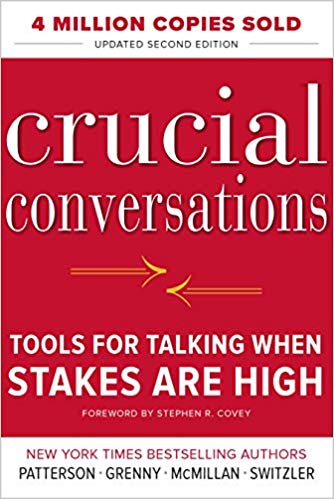

This article is an excerpt from the Shortform summary of "Crucial Conversations" by Kerry Patterson. Shortform has the world's best summaries of books you should be reading.
Like this article? Sign up for a free trial here .
What is the Goldilocks test? What does it have to do with crucial conversations?
The Goldilocks test is just what it sounds like—like the story, your method of communication shouldn’t be too hard, or too soft. It should be just right. Keep reading for tips on adjusting your communication approach, and examples of how to use the Goldilocks test.
How Do You Use the Goldilocks Test?
What is the Goldilocks test? You may have heard of it applied to other things, but the Goldilocks test works for crucial conversations, too. You can use it at any time to test how you’re approaching a conversation, and how the other person is perceiving you.
Your presentation should be neither too hard nor too soft, but just right. For example, if someone insists on telling you how to do something, don’t say: “I’m not stupid, you know.” (too hard) or “I know I’m a klutz, but…” (too soft). Instead, say: “I’m starting to feel like you don’t trust me. Is that what’s happening?” (just right).
Talk Tentatively
Once you use the Goldilocks test to determine the state of your conversation, your next steps are to figure out how to change your approach, and what might help. Let’s say the Goldilocks test told you to soften your message. Here’s how talking tentatively can help.
You’ll get people to listen if you describe both your facts and stories in a tentative, non-dogmatic way. Speaking tentatively means telling your story as a story, not presenting it as an incontrovertible fact. For example, start with phrases indicating you’re sharing an opinion, not asserting a fact: “In my opinion…”, or “I’m beginning to wonder whether…” (rather than, “The fact is…” or “It’s obvious to me that…”).
Speaking tentatively also means sharing in a way that shows confidence in your conclusions, but that also suggests you’re open to challenges.
You soften the message because you’re trying to add meaning to the pool, not force it on people. If you’re overly assertive, your information won’t be accepted (won’t make it into the pool).
In fact, when talking with people holding opposite opinions, the more convinced and forceful you act, the more resistant they’ll be. Speaking in absolutes decreases your influence. Conversely, the more tentatively you speak, the more open people become to your opinions.
Being tentative isn’t manipulative. You’re tentative because your opinions may not be totally accurate or your information may be incomplete. At the same time, you shouldn’t pretend to be less confident than you are. Just be aware that your observations and stories could be flawed.
Adjusting to the Goldilocks Test: Share Your Stories
On the other hand, the Goldilocks test may have told you that you need to share more information. Here’s how sharing your stories and stating your path can help you express yourself, and get a handle on what you need to say.
Sharing your point of view when you have something difficult to say isn’t easy, but you can learn to do it successfully. Remember, it’s important that everyone’s information, no matter how controversial, be included in the shared pool.
Most conversations start on autopilot with friendly small talk, but in high-stakes conversations, your emotions kick in and you don’t do as well.
When it comes to sharing touchy information:
- People often say nothing.
- They’re too blunt.
- They say only part of what’s on their mind — they understate their views for fear of hurting others, or they sugarcoat their message.
However, the best approach is to speak your mind completely, but in a way that makes it safe for others to hear and respond.
Setting the Stage
To speak honestly when it could offend others, you have to maintain safety by blending confidence and humility
Confidence: You must have the confidence to say what needs to be said to the appropriate person (and not complain to someone else), and confidence that you can speak honestly without attacking the other person.
Humility: You must be humble enough to realize that you don’t know everything, and you don’t always have to get your way. Your opinion is a starting point for discussion. With new information you might change your mind — so you express your opinion and also encourage others to express theirs.
STATE Your Path
To have a healthy conversation about a tough topic, you must take care not to violate respect or safety with threats and accusations, despite your worst fears. To create conditions conducive to dialogue:
When You Go Overboard
You can get into trouble by pushing your point of view too hard. It gets heated and you feel you have to win. Others resist, argue, or retreat into silence, so you push harder. In the end, no one is listening, and nothing is added to the pool of information. The Goldilocks test can help you identify those times.
Here’s how things go wrong.
- You feel you’re right. When you push your ideas on others, it’s generally because you feel you’re right and they’re wrong. You feel there’s no need to expand the pool of information because you have the answer.
- You feel justified in using verbal tricks. You stack the deck with supporting information, leaving out any contrary information; or you exaggerate or use inflammatory language. But the more forceful you become, the more resistance you generate.
How to Change
When you feel compelled to convince others that your way is best:
- Stop.
- Think about what you really want. Ask yourself, how you should behave to achieve what you want.
- Use your STATE skills
- Share your facts
- Tell your story
- Ask for others’ paths
- Talk tentatively
- Encourage testing
- Monitor conditions: Notice when people start to resist. Notice what you’re doing — for instance, leaning forward, getting louder, filibustering, etc. The more strongly you feel, the more likely you are to go overboard.
- Tone it down: Open your mind to the idea that others might have something relevant to say and ask them for their views. This isn’t easy— backing off when you feel strongly is counterintuitive, but passion can work against you.
- Stop yourself: When you start to feel frustrated that others aren’t getting it, be aware you’re on an unproductive path and back off. Hold onto your belief but moderate your approach.
The Goldilocks test can help you make adjustments if you don’t think the conversation is going the way you planned, or if it gets derailed into something else. Always make sure your approach is just right, and don’t hesitate to use the Goldilocks test if you’re unsure.

———End of Preview———
Like what you just read? Read the rest of the world's best summary of Kerry Patterson's "Crucial Conversations" at Shortform .
Here's what you'll find in our full Crucial Conversations summary :
- How to approach an argument without getting mad
- The mistakes most people make when trying to listen to someone else
- How to come up with win-win solutions that make everyone happy






